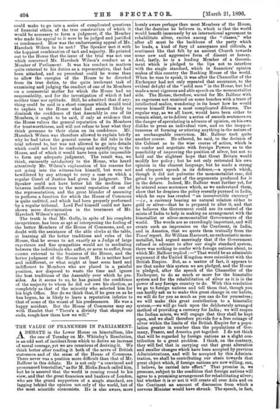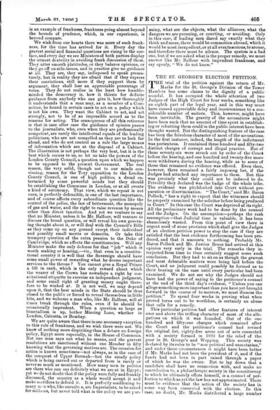'THE VALUE OF FRANKNESS IN PARLIAMENT. A DEBATE in the Lower
House on bimetallism, like the one of Tuesday on Mr. Whiteley's Resolution, is an odd sort of incident from which to derive an increase of moral courage, yet we are conscious of deriving it. We think better after reading it both of the nerve of British statesmen and of the sense of the House of Commons. There never was a position more difficult than that of Mr. Balfour in this debate. He is not only "a convinced and pronounced bimetallist," as Sir M. Hicks-Beach called him, but he is assured that the world is coming round to his ciew, and that the great financiers and bankers of London, who are the grand supporters of a single standard, are lagging behind the opinion not only of the world, but of the most scientific economists. He is also aware, more keenly aware perhaps than most Members of the House, that the doctrine he believes in, which is that the world would benefit immensely by an international agreement to rehabilitate silver, excites among the "classes," who after all must be the backbone of the party which he leads, a kind of fury cf annoyance and ridicule, a sentiment like that felt by an ancient Church towards some new and aggressive form of dissent or heresy. And, lastly, he is a leading Member of a Govern- ment which is pledged to the lips not to interfere with the single standard, which in financiers' opinion makes of this country the Banking House of the world. When he rose to speak, it was after the Chancellor of the Exchequer had not only repeated that assurance, to the evident delight of the "solid men" in the House, but bad made a most vigorous and able speech on the tnonometallist side. The House, therefore, waited for Mr. Balfour with an eagerness not unmixed on some benches with a trace of intellectual malice, wondering in its heart bow he would rescue himself from a most complicated dilemma. The regular way, as we all know, would have been either to remain silent, or to deliver a series of smooth sentences on the danger of speculating in advance of opinion, on his own dislike to press an individual view, and on the inoppor- tuneness of forming or uttering anything in the nature of an unchangeable conviction. Mr. Balfour took quite another course. He adhered, he said, to the decision of the Cabinet as to the wise course of action, which is to confer and negotiate with foreign Powers as to the possibility of improving the position of silver, but not to hold out the slightest hope that Great Britain would modify her policy ; but he not only reiterated his own opinion in the clearest language, but he made a strong and eloquent speech in its defence,—a speech which, though it did not pulverise the monometallist case, did grind to powder most of the arguments produced for it in the debate. Indeed, Mr. Balfour went further yet, for he uttered some sentences which, as we understand them, show that he despises the policy recently pursued in India, which he says has created "an inconvertible currency" —i.e, a currency bearing no natural relation either to gold or silver—that he is prepared to alter it, and that he believes the Government could use its control of the mints of India to help in making an arrangement with the bimetallist or silver-monometallist Governments of the world. The words are so exceedingly important, and will create such an impression on the Continent, in India, and in America, that we quote them textually from the Ti»zes' report. Sir William Harcourt, an enthusiastic mono- metallist, had argued sneeringly that if the Government refused in advance to alter our single standard system, there was nothing to confer with foreign nations about, to which Mr. Balfour replied :—" That would be an admirable argument if the United Kingdom were coincident with the British Empire. But, as a matter of fact, it appears to me that under this system we are pledged, and the House is pledged, after the speech of the Chancellor of the Exchequer, to do as much or more for the bimetallic system and for the rehabilitation of silver as it is in the power of any foreign country to do. With this resolution we go to foreign nations and tell them that, though you can hardly ask us to make this great change in our habits, we will do for you as much as you can do for yourselves; we will make this great contribution to a bimetallic system,—we will go back upon the deliberately arranged method of providing a currency for India; we will reopen the Indian mints, we will engage that they shall be kept open, and we shall therefore provide for a free coinage of silver within the limits of the British Empire for a popu- lation greater in number than the populations of Ger- many, France, and America put together. I do not think that will be regarded by foreign nations as a slight con- tribution to a great problem. I think, on the contrary, they will feel that in carrying out that great alteration and smaller changes which have been accepted by previous Administrations, and will be accepted by this Adminis- tration, we shall be contributing our share towards that great object which, if foreign nations are now willing, can, I believe, be carried into effect." That promise is, we presume, subject to the condition that foreign nations will agree to a promising arrangement for rehabilitating silver ; but whether it is or not it will create all over Asia and on the Continent an amount of discussion from which a nervous Minister would have shrunk. The speech, in fact, is an example of frankness, frankness going almost beyond the bounds of prudence, which, in our experience, is beyond compare. We wish from our hearts there was more of such frank- ness, for the time has arrived for it. Every day the gravest social and financial questions are rising to the sur- ‘ face, and every day we see Ministers of both parties display the utmost dexterity in avoiding frank discussion of them. They utter smooth platitudes, or they balance opinions, or they go off on side-issues, and in practice give no guidance at alL They are, they say, indisposed to speak prema- turely, but in reality they are afraid that if they express their convictions, still more if they support them by argument, they shall lose an appreciable percentage of votes. They do not realise in the least how humble- minded the democracy is, how it thirsts for definite guidance from anybody who can give it., how thoroughly it understands that a man may, as a member of a Com- mittee, be bound in certain cases to act on a policy which is not his own. They want the Cabinet to act, and act strongly, not to be of an impossible accord as to the reasons for acting. The consequence of all this reticence is that in case after case the guidance of opinion passes to the journalists, who, even when they are professionally competent, are rarely the intellectual equals of the leading politicians, who are not compelled as they are to look far ahead, and who do not control as a rule the large means of information which axe at the disposal of a Cabinet. The illustration is not perhaps the very best, but it is the best which occurs to us, so let us take the powers of the London County Council, a question upon which we happen to be opposed to the present Government. The real reason, the very solid, though not to our minds con- vincing, reason for the Tory opposition to the London County Council, is one of high politics, a dread en- tertained by some powerful minds lest they should be establishing the Commune in London, or at all events a kind of autonomy. That view, which we repeat is not ours, is perfectly defensible, is one of the last importance, and of course affects every subordinate question like the control of the police, the law of betterment, the monopoly of gas and water, and the right to raise revenue by means other than direct taxation. And yet we venture to say that no Minister, unless it be Mr. Balfour, will venture to discuss the broad question, or will reveal his own govern- ing thought about it, or will deal with the Council's Bills as they come up on any ground except their individual and possibly small merits or demerits. Or take this trumpery question of the extra pension to the Duke of Cambridge, which BO affects the constituencies. Will any Minister make the only defence for that "job" which is worth making or hearing,—viz., that even in a constitu- tional country it is well that the Sovereign should have some small power of rewarding what he deems important services to the throne ? You cannot give a Royal Prince a lift in rank, which is the only reward about which the wearer of the Crown has nowadays a right by con- stitutional etiquette to exercise an independent judgment, and some small right of granting money ought there- fore to be winked at. It is not well, we may depend upon it, that the best minds in the State should be thus closed to the public or forced to reveal themselves in little bits, and we welcome a man who, like Mr. Balfour, will at times break through the rules, even if he should be occasionally imprudent When a question so large as bimetallism is up, bother Mincing Lane, whether in London, Calcutta, or Bombay.
We are quite aware that there is one necessary exception to this rule of frankness, and we wish there were not. We know of nothing more dispiriting than a debate on foreign policy, Egypt more especially, in the House of Commons. Not one man says out what be means, and the grayest resolutions are sanctioned without one Member in fifty knowing what the governing motives are. The occasion for action is known sometimes—not always, as in the case of the conquest of Upper Burmah—but the steady policy which is being carried out or departed from is rarely or never so much as mentioned. How many men in politics are there who can say definitely what we are at in Egypt ; yet we do not doubt that if the policy were fully and frankly discussed, the country as a whole would accept it and make sacrifices to defend it. It is perfectly maddening to many rie-n who, like ourselvt s, are Imperialists, to be asked for millions, but never told shat is the policy we are pur- suing, what are the objects, what the alliances, what the dangers we are pursuing, or courting, or avoiding. Only in this case, if leading men dared say exactly what they think and mean, there would be commotion abroad, which it would be most inexpedient, or at all events serious, to arouse, and therefore there must be silence. The system is a bad one, but if we are asked what is the proper remedy, we must answer like Mr. Balfour with imprudent frankness, and say openly, "We do not know."







































 Previous page
Previous page